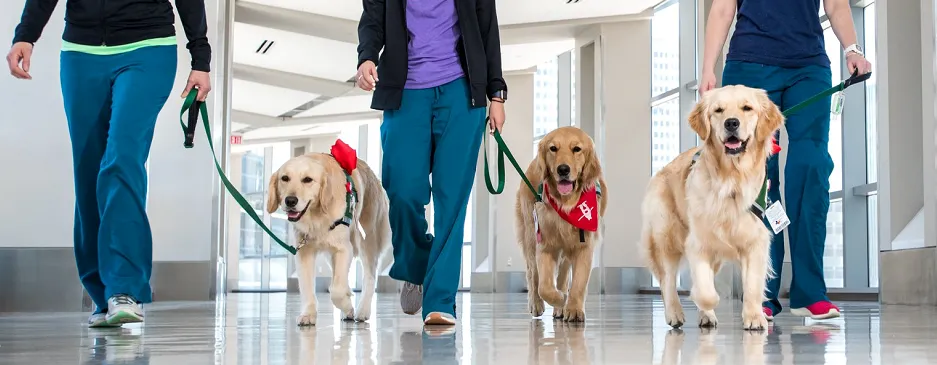Facility Dogs
We're focused on studying the effects of a unique human-animal interaction between people and professional therapy dogs, called facility dogs.
What are Facility Dogs?
Facility dogs are professional, full-time therapy dogs specially trained for their roles. These dogs are different from volunteer and visiting therapy dogs in that they are employed to accompany a human professional full-time in their day-to-day work.
Our Research
The OHAIRE Group is also collaborating with a service dog and facility dog provider, Canine Assistants, for the third study made possible by the four-year partnership funded by Elanco. This is the first national study of the impact of facility dogs on their handlers’ mental health and job-related well-being. Although facility dogs are increasingly popular in hospitals to improve the patient experience, little is known about how they may affect the hospital personnel they work with. Using surveys, including standardized measures for job satisfaction, burnout, and stress, this study aims to compare pediatric hospital personnel working with facility dogs and similar personnel working without one.
What are Facility Dog’s Jobs in Children’s Hospitals?
Facility dogs in pediatric hospitals have learned how to assist personnel in many roles to improve the patient experience. These dogs have been taught to move comfortably around standard hospital equipment, such as gently getting on or off a hospital bed when asked. Prior studies have found that facility dogs may benefit patients’ physical and mental health [1, 2], with specific effects including reduced fear, less anxiety, and lower perceived pain [3].

What Do They Do?
The role of facility dogs accompanying a human professional is to facilitate or enhance interactions with the professional’s patients or clients. Facility dogs have been trained to be comfortable in their work settings. Currently, facility dogs are most commonly found in hospitals, police stations, and courtrooms.
Beyond the Patients, Can Facility Dogs Help Pediatric Hospital Personnel?
Individuals working in high-stress environments, such as healthcare, are at risk for job-related burnout and poor mental health [4]. In prior healthcare research, burnout has been linked to poor job performance and a lower quality of patient care [5, 6]. The effects of burnout on job performance and patient care may be buffered by positive social support [7]. Although investigations of this buffer have focused on human social support, there have also been studies in the field of human-animal interaction suggesting that pets and companion dogs offer support beneficial for stress [8, 9]. Based on this, can healthcare professionals gain social support and experience work-life benefits from their facility dog colleagues? The OHAIRE lab is currently conducting a national study to determine the potential effects of facility dogs on pediatric hospital personnel's mental health and job-related well-being.
- Kline, J. A., Fisher, M. A., Pettit, K. L., Linville, C. T., & Beck, A. M. (2019). Controlled clinical trial of canine therapy versus usual care to reduce patient anxiety in the emergency department. PLOS ONE, 14(1), [e0209232].
- Crossman, M. K., Kazdin, A. E., Matijczak, A., Kitt, E. R., & Santos, L. R. (2018). The Influence of interactions with dogs on affect, anxiety, and arousal in children. Journal of Clinical Child & Adolescent Psychology, 00(00), 1-14.
- Tsai, C., Friedmann, E., & Thomas, S. A. (2010). The effect of animal-assisted therapy on stress responses in hospitalized children. Anthrozoös: A multidisciplinary journal of the interactions of people & animals, 23(3), 245-258.
- Wood, B. D., & Killion, J. B. (2007). Burnout among healthcare professionals. Radiology Management, 29(6), 30-34.
- Hall, L. H., Johnson, J., Watt, I., Tsipa, A., & O’Connor, D. B. (2016). Healthcare staff wellbeing, burnout, and patient safety: A systematic review. PLOS ONE, 11(7), [e0159015].
- Reader, T. W., Cuthbertson, B. H., & Decruyenaere, J. (2008). Burnout in the ICU: Potential consequences for staff and patient well-being. Intensive Care Medicine, 34(1), 4-6.
- Eastburg, M. C., Williamson, M., Gorsuch, R., & Ridley, C. (1994). Social support, personality, and burnout in nurses. Journal of Applied Social Psychology, 24(14), 1233-1250.
- Beck, A. M. (2014). The biology of the human-animal bond. Animal Frontiers, 4(3), 32-36.
- Beetz, A. M. (2017). Theories and possible processes of action in animal assisted interventions. Applied Developmental Science, 21(2), 139-149.
